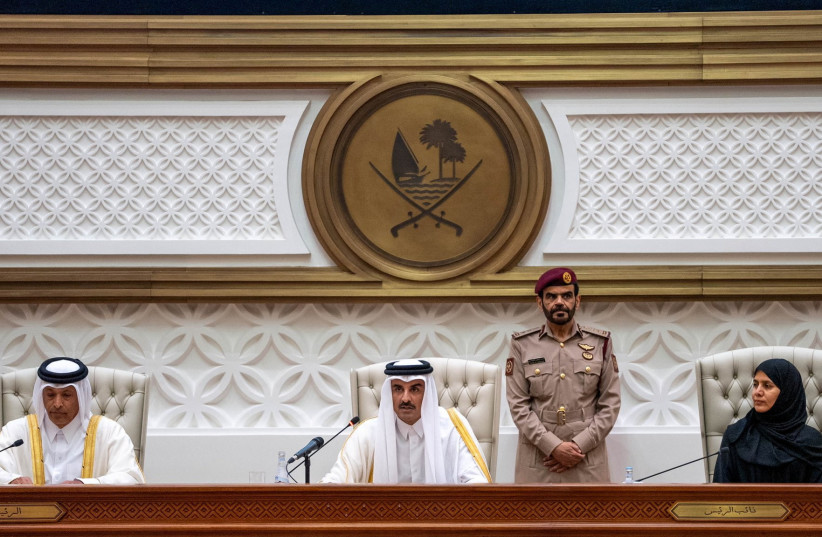In the wake of the October 7 terrorist attack on Israel, it’s imperative to confront a harsh reality: Qatar’s continued support for terrorist organizations like Hamas directly undermines global efforts to combat extremism and threatens the security of both the United States and its allies. As one of the world’s foremost sponsors of terrorism, Qatar’s dual role as a major American ally and a financial lifeline to terrorist groups demands immediate scrutiny and action.
For decades, Qatar has given money and protection to the leaders of terrorist organizations like al-Qaeda, ISIS, and Hamas.
Currently, Qatar hosts the leaders of Hamas, the terrorist organization behind the October 7 attack on Israel. Qatar and Hamas are both adherents of the Muslim Brotherhood. Qatar has given Hamas billions of dollars due to this shared affinity. Although Qatari leaders deny that they knew about the October 7 attack in advance, without their financing, the attacks would never have been possible.
Qatar is home to the largest US military facility in the Middle East. The al-Udeid Air Base holds United States Central Command, the strategic hub for all US military activity in the Middle East, and over 10,000 American soldiers.
Qatar officially holds the security designation of “major non-NATO ally,” a term for 18 countries friendly to the US which, along with Israel, includes nations such as Japan, Jordan, and Australia.

The US cannot afford to provide Qatar with that level of trust.
Qatar is vastly wealthy, has a tiny landmass and population, and sits directly between Saudi Arabia and Iran, bitter rivals. Qatar survives by spreading its wealth and playing both sides.
This strategy has previously backfired on Qatar. In 2017, Saudi Arabia cited Qatar’s ties with the Muslim Brotherhood and terror organizations as its reason for cutting ties with Doha and blockading Qatar.
The US military presence ensured that Saudi Arabia would not attack Qatar. Doha turned to Turkey and Iran for imports. Ultimately, Saudi Arabia lifted the blockade in anticipation of Qatar hosting the 2022 World Cup.
The 2022 World Cup bolstered Qatar’s strategy of “sportswashing,” i.e., laundering its reputation through sports, which Qatar has pursued aggressively for almost two decades.
The strategy was primarily executed through Qatar Sports Investments, founded in 2005. Qatar quietly invested $4 billion in Monumental Sports & Entertainment, the NHL’s Washington Capitals parent company, the NBA’s Washington Wizards, and the WNBA’s Washington Mystics. Qatar was FC Barcelona’s main shirt sponsor between 2011-17 and is a majority owner of the soccer club Paris Saint-Germain.
Qatar's western influence
Qatar’s influence in Western cultural institutions goes far beyond sports. Since 2001, Qatar has donated billions to American universities. These include prestigious universities like Northwestern, Georgetown, Cornell, and Carnegie Mellon, all of which have affiliations and campuses in Qatar in exchange for hundreds of millions of dollars each year. Qatar’s money comes with its exertion of soft power; in return, the universities hold their noses and compromise their values.
IT IS no coincidence that these payments began almost immediately after 9/11. Qatar knew that its role in supporting terror would be scrutinized and proactively moved to influence public opinion in the US.
Qatar’s public relations and diplomacy have been skillful, to say the least.
Recently, news that an alleged Qatari spy operation targeted Republican lawmakers was released. Nonetheless, a day later, envoys from the Biden administration went to Doha to continue negotiations on an Israel-Hamas ceasefire.
The emir of Qatar has the ear of the president of the United States. Qatar is hailed as “being on the front and center of global diplomacy.” It is credited for helping to negotiate the ceasefire agreement between Israel and Hamas and the accompanying release of Israeli hostages.
Current US strategy holds that Qatar is useful as a go-between between American interests and terrorist organizations. However, Qatar is not an independent third party. Through its generous financial support, it is directly responsible for the atrocities that Hamas and similar groups commit.
The US cannot afford to wait for another September 11 or October 7 to wake up to the dangers of having vital military and diplomatic interests in a country that houses the leaders and financiers of terrorist organizations bent on destroying the United States and Israel.
If Qatar does not end its support of Hamas, the US must condemn and sanction Qatari leaders and institutions.
The US must increase oversight of Qatari finances and freeze funds that are being used for terror. The Biden administration must be willing to use all its leverage, including the renewal of the al-Udeid Air Base, to force Qatar to abandon Hamas.
Qatar believes it has free rein to act as it pleases because of its strategic location and role as a regional interlocutor. However, the US cannot trust Qatar to be a neutral actor in the context of a war that Qatar itself helped to bring about.
For the sake of American and Israeli security, Qatar must be held to account for its sponsorship of terror.
The writer is director of the Middle East Forum and a former official in the Israel Foreign and Defense Ministries.
